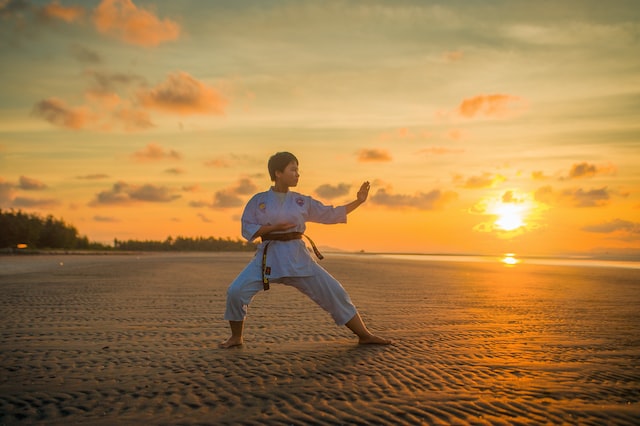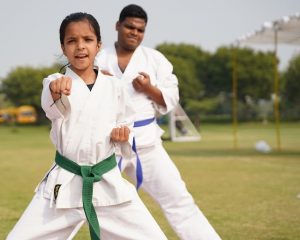 AP writes: "A friend of mine from work, Chris, is a practicing Catholic with 5 children. Before marriage, he was even in the seminary. He is very orthodox. He also happens to have a number of black belts in all sorts of martial arts. I have two teenage daughters and and a 11 year old son. I want them to be able to protect themselves, especially when they go off to college. Last night, Chris came over and gave us family Karate lessons. I thought it was wonderful. The stretching and exercising were great. He talked about the Eucharist. The only thing that was a little bizarre is that in Okinawan Karate, and I think other Karate, they bow when they enter the dojo. . .
AP writes: "A friend of mine from work, Chris, is a practicing Catholic with 5 children. Before marriage, he was even in the seminary. He is very orthodox. He also happens to have a number of black belts in all sorts of martial arts. I have two teenage daughters and and a 11 year old son. I want them to be able to protect themselves, especially when they go off to college. Last night, Chris came over and gave us family Karate lessons. I thought it was wonderful. The stretching and exercising were great. He talked about the Eucharist. The only thing that was a little bizarre is that in Okinawan Karate, and I think other Karate, they bow when they enter the dojo. . . . . . The dojo was our living room. Anyways, it was great family time and we all appreciated the visit. The problem is last night I had nightmares and it had to do with evil. I know God speaks to us in our dreams and I don’t know if He was trying to say this is a bad thing or if it was the enemy trying to discourage us from sharing good family time together and would rather have us sitting down and watching TV."
It's impossible for me to comment on whether your dream had any connection to the karate lesson you received, or if it was a communication from God. However, the fact that the dream was disturbing and you seem to associate it with the karate class that took place in your home suggests that you might want to discuss this with a spiritual director or parish priest.
As for Okinawan Karate, it originated centuries ago as an indigenous fighting art of the Okinawan people. They were seafaring people who were in constant contact with Southeast Asia and China where it is believed Okinawan seamen would visit and incorporate the local fighting techniques into their own. Several times throughout their history, the island nation was invaded by conquerors who banned all weapons, which left the people with nothing more than their "empty hands" to fight with. (The word karate means "empty hand".)
Modern forms of Okinawan karate can be traced to Satunuku Sakugawa (1733-1857) who studied the martial arts in China in the late 18th century and brought his new style back to Okinawa. There are several different versions of Okinawan karate which are named after the major cities where each was developed - Shuri, Naha, and Tomari.
Like all martial arts, Okinawan karate has roots in eastern spirituality and is considered to be a way of life which is based on an oriental worldview.
It's also important to note that some forms of martial arts are more religious than others. For example, Judo, Jujitsu, and Tae Kwon Do (Korean karate) have a low spiritual emphasis.
Karate, on the other hand, requires meditation, which usually involves emptying the mind of distractions but since karate is primarily a physical martial art, the meditation aspect can be divorced from it.
Other forms can be more problematic. For example, Aikido means "the way to union with the universal force", with this force being known as "chi." Christians do not believe in, nor does science support, the concept of a "universal force" so a practitioner of Aikido is ultimately uniting himself or herself with a false god.
Ninjitsu is another form that is not compatible with Christianity because it professes a pantheistic worldview that believes all is God.
Tai Chi is off-limits because it involves the practice of Taoism.
As is the case with all martial arts study in the U.S., much depends on the teacher. If the instructor promotes an eastern mystic philosophy, then Christians should avoid it. If the instructor does not and focuses purely on the physical aspects, it's okay to practice. (This is different from yoga where the positions themselves have a spiritual meaning - which is not the case with karate.)
However, because of the many "gray areas" in the practice of martial arts, Christians who do choose to get involved should make time for proper discernment. This article by The Christian Research Institute lists six points a Christian should consider before becoming involved in the martial arts
First, examine your motives to be sure you're getting involved for the right reasons - self-defense - rather than to be a "tough guy."
Second, examine your conscience to determine how you feel about using maneuvers, blows, and kicks that could severely injure someone in a hostile encounter.
Third, realize that the practice of the martial arts requires discipline and strenuous training. Will it take time away from your vocation in life or religious commitments?
Fourth, consider the instructor. Is he/she a Christian? Are they practicing the faith, or doing so with an Eastern world view or in a nonreligious context? As the article advises, "One should seek to discover whether the instructor encourages an Eastern concept of meditation, chi, or Eastern philosophies" because these influences will make their way into the practice being taught.
Fifth, is the classroom littered with Eastern religious books, symbols, statues, etc.? The discerning Christian should also consider attending an advanced class to determine if Eastern religious views are incorporated only after the student has progressed to a certain degree.
Sixth, consider if your involvement in the martial arts might cause scandal to a weaker Christian brother or sister. "...[A] weaker Christian might conclude (for example) that it’s okay to practice Zen meditation since his more mature brother practices the martial arts, thereby (apparently) giving approval for all that is involved in the martial arts," the article states. "One must be especially careful to guard against inadvertently communicating an endorsement of more than just the physical sport aspect of the martial arts."
In conclusion, be mindful of what Scripture tells us: “If any of you lacks wisdom, he should ask God, who gives generously to all without finding fault, and it will be given to him” (James 1:5).
This is why Christians who are considering participation in the martial arts should pray for wisdom before doing so.
© All Rights Reserved, Living His Life Abundantly®/Women of Grace® http://www.womenofgrace.com

